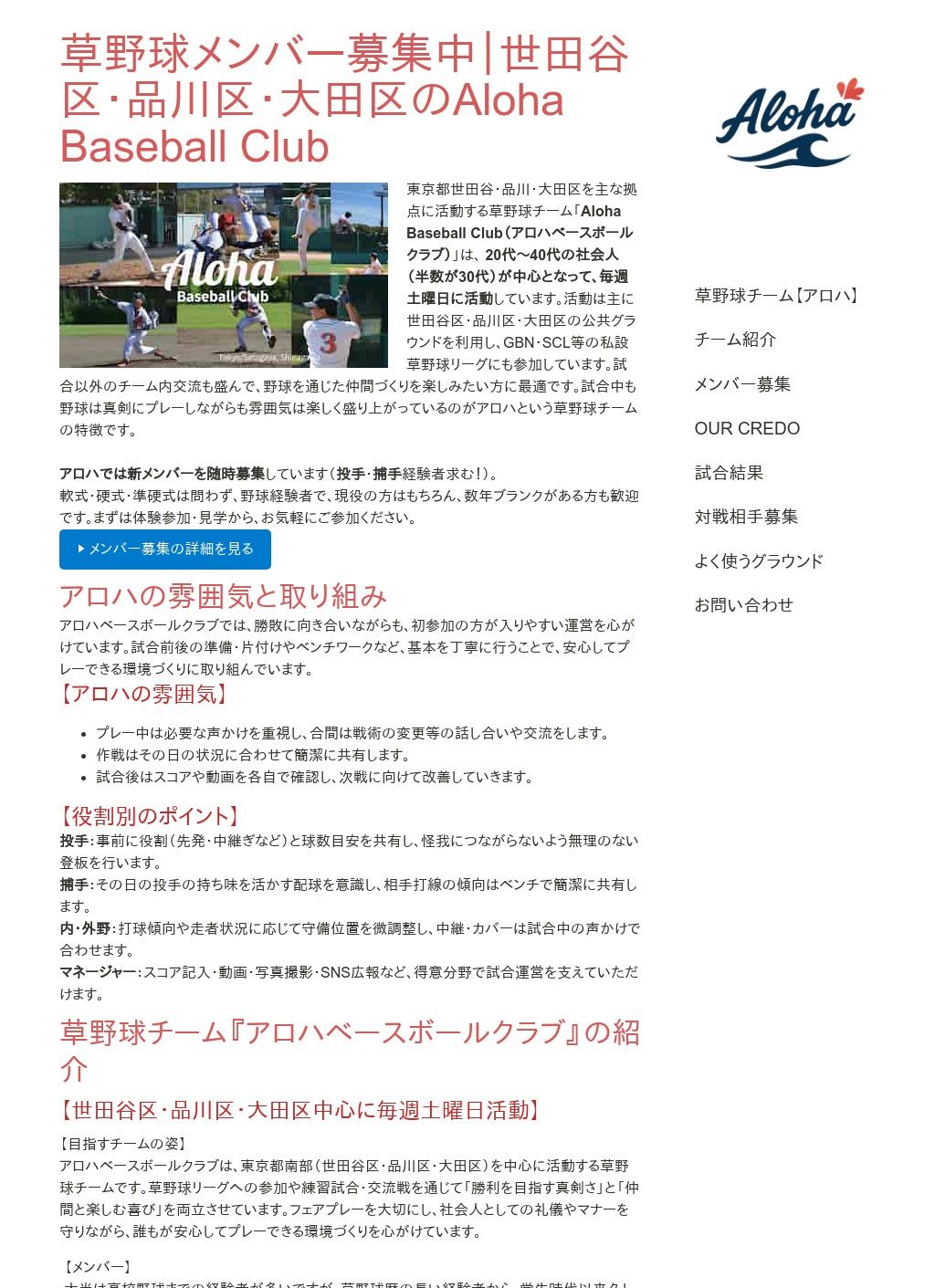Aloha Baseball Club's website serves as the digital home for a recreational baseball team operating in Tokyo's southern districts. The site functions as both a recruitment platform for new members and an information hub for the team's activities across Setagaya, Shinagawa, and Ota wards. Founded in 2002, this amateur baseball organization maintains a consistent Saturday schedule throughout the year, balancing competitive play with social camaraderie.
The team composition consists primarily of working professionals in their twenties through forties who bring varied baseball backgrounds to the roster. Members include former players from junior high, high school, and university programs, spanning both hardball and rubber-ball formats. The professional diversity reflects Tokyo's business landscape, with players working in sectors like internet technology, advertising, securities, venture capital, life insurance, real estate consulting, and law enforcement.
Practice and game locations rotate among several public facilities in Tokyo's southern region. The team regularly uses Futako-Tamagawa Community Sports Facilities and Setagaya Park in Setagaya Ward, Oi Wharf Central Seaside Park in Ota Ward, and Yashio North Park in Shinagawa Ward. These venues provide accessible options for members residing in different parts of the metropolitan area, with most grounds situated near major train lines for convenient weekend access.
Competition forms the core of Aloha's activities, with the team participating in multiple amateur baseball leagues and tournaments. Their track record includes notable achievements in grassroots baseball competitions, including an SCL Championship Tournament victory in 2013, runner-up finishes in 2012 and 2022, and success in the GBN National Amateur Baseball Tournament where they reached the semifinals of the Kanto Division 2 in 2013. The team plays approximately 40 matches annually, mixing league games with friendly exhibition matches.
Financial obligations for members remain relatively modest compared to many organized sports clubs. New members purchase team uniforms upon joining, while existing players contribute to equipment costs through biannual fees. First-year members receive a half-year fee exemption as an introductory benefit. Ground rental costs operate on a deposit system where participants pay per game attendance rather than fixed monthly dues.
The recruitment approach emphasizes inclusivity for experienced players regardless of their current skill level or time away from the sport. Many current members resumed playing after extended breaks following their student days, creating an environment where returning players feel comfortable rebuilding their skills. The website particularly notes interest in recruiting pitchers and catchers, positions that often prove challenging to fill in amateur teams.
Recent match results displayed on the site show active competition through July 2025, with games against teams like Aoiharu, Bakuretsu R's, and Lion Baseball Club. Score updates indicate competitive matches with the team maintaining a mixed win-loss record. The schedule section projects upcoming games through August, demonstrating consistent planning and opponent coordination.
The FAQ section addresses common concerns prospective members might have about joining. Questions cover participant demographics, trial participation options, activity frequency, associated costs, practice locations, and team skill level. Each answer provides practical information without overselling, acknowledging that the team suits players comfortable with fundamental baseball skills while maintaining a balance between winning and enjoyment.
Team philosophy centers on what they call grateful competition – recognizing that baseball requires opponents and umpires to make games possible. This perspective shapes their approach to fair play and sportsmanship, even while maintaining competitive ambitions. The stated goal involves building strong defensive capabilities anchored by solid pitching, combined with adaptable offensive strategies suitable for amateur-level play.
Geographic diversity characterizes the membership base, with roughly half the players originating from outside Tokyo. Members hail from prefectures including Aomori, Fukushima, Aichi, Osaka, Kyoto, Hyogo, Hiroshima, Yamaguchi, Kagawa, and Fukuoka. Many joined after relocating to Tokyo for employment, finding the team through online searches during their adjustment to metropolitan life.
The website's structure prioritizes essential information delivery over visual complexity. Main sections cover team introduction, member recruitment details, activity schedules, and contact methods. Match results and upcoming game information receive prominent placement, reflecting the importance of keeping current and prospective members informed about team activities. The site avoids excessive technical baseball jargon, making content accessible to players at various experience levels.
Long-term operational stability emerges as a subtle selling point throughout the site content. With over two decades of continuous operation since 2002, the team has developed established procedures for ground reservations, league participation, and member management. This institutional knowledge helps ensure consistent activity levels throughout the baseball season, addressing a common concern about amateur teams that struggle with sustainability.
Social aspects receive equal emphasis alongside competitive play. The website describes members as developing family-like relationships extending beyond the baseball diamond. This community element appeals to transplanted workers seeking social connections in Tokyo, particularly those from regional areas adjusting to urban life. The multicultural professional backgrounds create networking opportunities beyond purely athletic pursuits.
Contact mechanisms remain straightforward, with an inquiry form serving as the primary communication channel for interested players. The site encourages trial participation before commitment, allowing potential members to experience team dynamics firsthand. This try-before-joining approach reduces pressure on newcomers while helping ensure good fits between individuals and team culture.
Business address
Meguro,
Meguro-ku,
Tokyo
Japan
